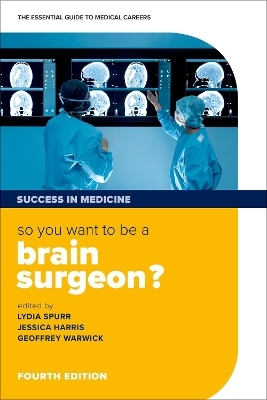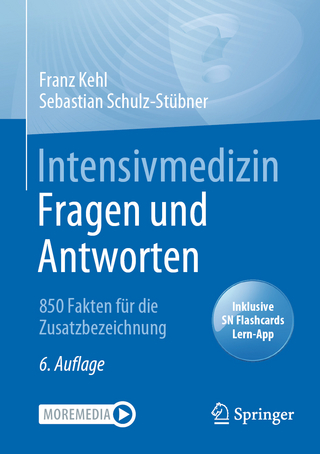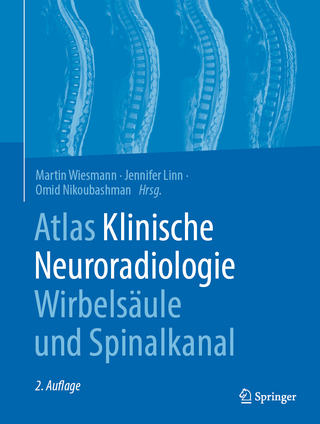
So you want to be a brain surgeon?
Oxford University Press (Verlag)
978-0-19-877949-0 (ISBN)
A medical degree opens many doors, but how do you decide which is the right one to go through? Whether you are wondering how to choose a career or want to know how to follow a particular path, you'll find the answers in this book.
Deciding which medical career to pursue has a huge impact on your future, and yet few doctors or medical students ever receive formal careers advice. Fortunately help is at hand: this book has been fully rewritten to include the latest information on training and career progression, as well as summaries of over 100 different careers open to medical graduates.
Whether you aspire to be a general practitioner, medical manager, forensic pathologist or even a brain surgeon, you'll find details on the job, lifestyle, and specific career route. Each career chapter has been written by specialists in their field to give you a unique 'insider's opinion', resulting in the most complete and up to date medical careers guide ever published.
Alongside the careers chapters there are new and updated sections on the Foundation Programme, Core Training, Specialty Training, and Academic Training. These describe the major hurdles in each area and how to overcome them. In addition, alternatives and adaptations to formal training are explored, including taking time out, working outside the UK, and working less than full time. From choosing jobs and filling application forms, to interviews and improving your CV, this book covers every aspect in detail.
Lydia Spurr is a registrar in Respiratory and General Internal Medicine in London, currently completing an MD(Res) at the Royal Brompton Hospital and Imperial College London. Her research interests include ventilatory failure and neuromuscular disorders. She also has an interest in medical education and has completed a Postgraduate Diploma in Medical Education. As an undergraduate she was awarded a Wolfson Foundation Scholarship to support research during her intercalated degree in Molecular Pharmacology at Barts and the London. Jessica Harris is a Consultant Psychiatrist. She completed her medical training at Manchester University, before moving to London and completing Specialty Training in South West London and St Georges Mental Health Trust, with accreditation in Liaison Psychiatry. She now works in Maternity Services at Oxford University Hospitals NHS Foundation Trust, providing integrated Psychiatric care for maternity patients, often those facing complex pregnancies. Geoffrey Warwick is a consultant respiratory and general physician in London. He completed his MD in Australia into non-invasive assessment of obstructive lung disease. His has an interest in medical education and is a director of two training programmes.
1. Career routes- the 'usual' route
1: Career overview
2: Foundation programme
3: Specialty training
4: Membership exams
5: Consultant
6: General practitioner
2. Career routes- 'alternative' routes
7: Specialty and associate specialist (SAS) doctors
8: Alternatives to a Certificate of Completion of Training (CCT)
9: Switching career paths
10: Academic career
11: Armed Forces career
12: 'Off the beaten path' and portfolio careers
13: Overseas career
14: Leaving clinical medicine
3. Specialty overviews
15: Introduction
16: Acute care common stem (ACCS)
17: Anaesthetics
18: General practice (GP)
19: Medical specialties
20: Obstetrics and gynaecology (O&G)
21: Paediatrics
22: Pathology
23: Psychiatry
24: Public health
25: Radiology
26: Surgery
27: Surgery continued
4. Choosing careers and getting jobs
28: Choosing a career
29: Finding jobs
30: Surviving the recruitment system
31: Interviews and selection centres
32: What happens next?
33: Competition for CT1/ST1 applications
34: Competition for ST3/ST4 applications
35: Staying competitive
36: Curriculum vitae (CV)
37: Portfolios and ePortfolios
38: Applying for academic training
39: Applying from overseas
5. Training and working in medical careers
40: Postgraduate training: Modernising Medical Careers (MMC)
41: Postgraduate training: Shape of Training (SoT)
42: Overseeing education
43: Less than full time training
44: Doctors' pay
45: Taking time out
46: Working abroad
47: Discrimination
48: Women in medicine
49: Myths debunked
6. Career chapters
50: Academic medicine
51: Academic surgery
52: Acute medicine
53: Allergy
54: Anaesthetics
55: Armed Forces: Army
56: Armed Forces: Royal Air Force
57: Armed Forces: Royal Navy
58: Audiovestibular medicine
59: Aviation and space medicine
60: Bariatric and metabolic surgery
61: Cardiology
62: Cardiothoracic surgery
63: Chemical pathology
64: Clinical genetics
65: Clinical neurophysiology
66: Clinical oncology
67: Clinical pharmacology and therapeutics
68: Dermatology
69: Diving and hyperbaric medicine
70: Elderly medicine
71: Emergency medicine
72: Emergency medicine: paediatrics
73: Emergency medicine: pre-hospital care
74: Endocrinology and diabetes
75: ENT (otolaryngology)
76: Expedition medicine
77: Fertility medicine
78: Forensic medicine
79: Forensic pathology
80: Gastroenterology
81: General practice (GP)
82: GP: Academic
83: GP: Private practice
84: GP: Rural setting
85: GP: Secure environments
86: GP with Extended Roles
87: General surgery
88: Genitourinary medicine
89: Gynaecological oncology
90: Haematology
91: Hand surgery
92: Histopathology
93: Immunology
94: Infectious diseases and tropical medicine
95: Intensive care
96: Locuming
97: Media medicine
98: Medical education
99: Medical entrepreneur
100: Medical ethics
101: Medical management consultancy
102: Medical manager
103: Medical microbiology
104: Medical oncology
105: Medical politics
106: Médecins Sans Frontières (MSF)
107: Medico-legal adviser
108: Metabolic medicine
109: National healthcare policy & leadership
110: Neonatal medicine
111: Neurology
112: Neurosurgery
113: Nuclear medicine
114: Obstetric medicine
115: Obstetrics & gynaecology
116: Occupational medicine
117: Oncoplastic breast surgery
118: Ophthalmology
119: Oral & maxillofacial surgery
120: Orthopaedic surgery
121: Paediatric surgery
122: Paediatrics
123: Paediatrics: Cardiology
124: Paediatrics: Community
125: Pain management
126: Palliative medicine
127: Pharmaceutical medicine
128: Plastic and reconstructive surgery
129: Psychiatry: child and adolescent
130: Psychiatry: general adult
131: Psychiatry: intellectual disability
132: Psychiatry: old age
133: Psychiatry: psychotherapy
134: Public health
135: Radiology: diagnostic
136: Radiology: interventional
137: Rehabilitation medicine
138: Renal medicine
139: Respiratory medicine
140: Rheumatology
141: Sexual and reproductive healthcare
142: Spine surgery
143: Sport and exercise medicine
144: Transfusion medicine
145: Transplant medicine
146: Transplant surgery
147: Trauma surgery
148: Urogynaecology
149: Urology
150: Vascular surgery
151: Virology
152: Voluntary Services Overseas (VSO)
| Erscheinungsdatum | 13.04.2022 |
|---|---|
| Reihe/Serie | Success in Medicine |
| Verlagsort | Oxford |
| Sprache | englisch |
| Maße | 156 x 234 mm |
| Gewicht | 1 g |
| Themenwelt | Sachbuch/Ratgeber ► Beruf / Finanzen / Recht / Wirtschaft ► Bewerbung / Karriere |
| Medizinische Fachgebiete ► Chirurgie ► Neurochirurgie | |
| Sozialwissenschaften ► Pädagogik ► Berufspädagogik | |
| ISBN-10 | 0-19-877949-6 / 0198779496 |
| ISBN-13 | 978-0-19-877949-0 / 9780198779490 |
| Zustand | Neuware |
| Haben Sie eine Frage zum Produkt? |
aus dem Bereich


